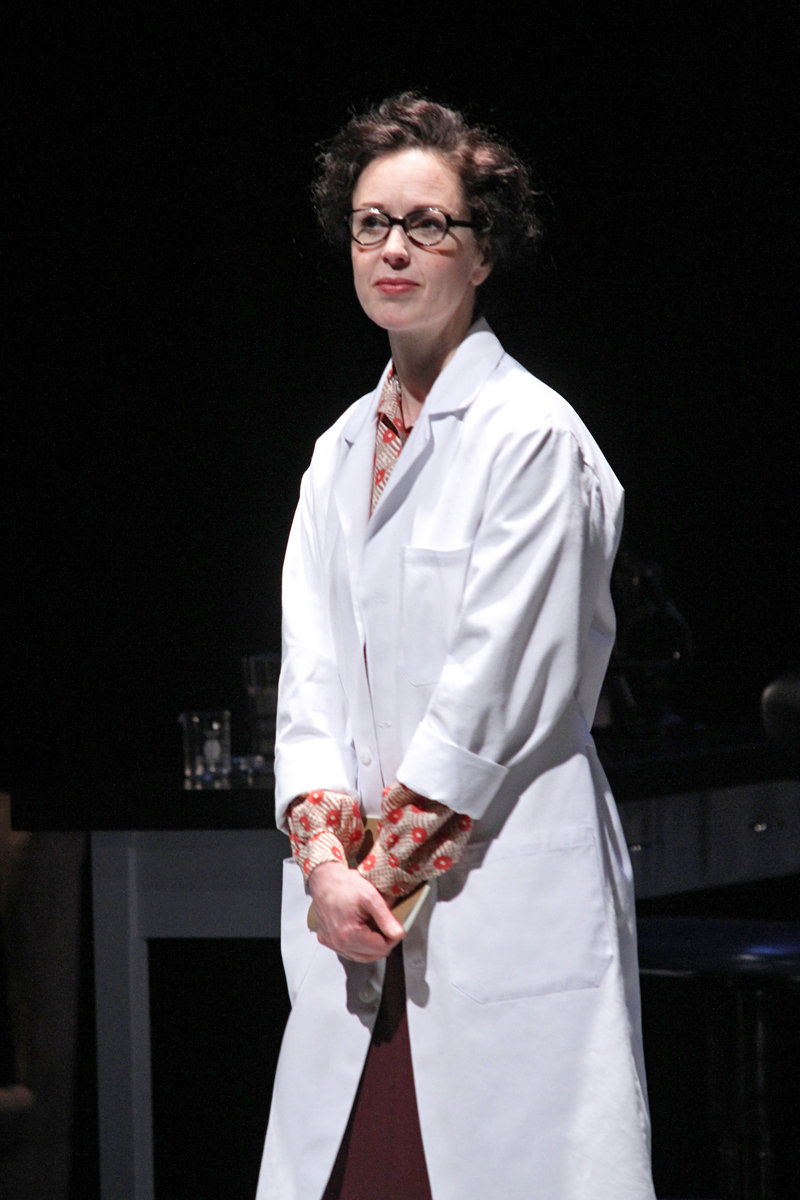Have you noticed the recent profusion of plays about science? Ever since 1998’s Copenhagen (Michael Frayn’s brilliant mystery about Niels Bohr, Werner Heisenberg, and the A-bomb), playwrights have been situating drama, real or imagined, in the science world.Squint and you can usually see Copenhagen’s bones poking through the skin of these later plays in the form of Frayn-style characters narrating their stories in a polyphony of observations, mixing them with lessons about the underlying science. This can be a lethally annoying formula when handled poorly. But done well, interwoven with elements from outside the laboratory (like geopolitics or discrimination), it can generate significant heat.This is the template Anna Ziegler’s praiseworthy Photograph 51 builds on. Her heroine is Rosalind Franklin, the mysterious female figure in the shadows of James Watson and Francis Crick, who claimed all the credit for describing our DNA. Franklin was a crystallographer (studying the arrangement of atoms in solids), and her X-ray images helped reveal DNA’s double-helix structure. But she was a woman in the man’s world of King’s College, London, and Jewish to boot. Shut out from the fraternal deal-making of the chauvinistic early ’50s, she toils in a hostile vacuum. That much, according to the playbill, is true. The rest of Ziegler’s 2008 play is invention—especially a colleague’s romantic interest in Franklin.Skillfully helmed by Braden Abraham, Seattle Rep’s production excels on every score, maximizing the script’s charms. As Franklin, Kirsten Potter (Or,) banishes all charisma from her person, yet somehow manages to magnetically compel anyone in her ambit. She may be lovelier than the real-life Franklin, but her guileless putdowns leave scratches on all her colleagues. “I don’t want to be your friend, Dr. Wilkins,” she informs her intellectually inferior boss (a role nicely self-effaced by Bradford Farwell), who has presented her with a box of chocolates. “You don’t command my respect,” she adds. Despite such candor, most of her labmates admire her, or are at least intrigued. Even the play’s villain, the cocky young Dr. Watson (an excellent, wild-haired Benjamin Harris), begrudgingly validates her work—in that shiftiest of ways: by stealing it. “You can’t be in the race and ignore it,” he rationalizes, impugning her refusal to politick.Rounding out the scientific community are Crick (MJ Sieber); Franklin’s assistant Ray Gosling (an endearing Brian Earp); and the closest thing to a real love interest, the American Don Caspar (Aaron Blakely), whose affections are the first and only that Franklin doesn’t shun. Flanking Scott Bradley’s superb lab set—replete with magnificent old microscopes and knobby, tubey X-ray machines—are cool, midcentury-modernist lounge areas where the cast retires between scenes. The setup effectively conveys how the goings-on in Franklin’s lab were under the covert scrutiny of the scientific world, an effect magnified by L.B. Morse’s fluorescent lab lights.Like the DNA “crystals” Franklin photographs, the play itself is a double helix, with the rival teams (Franklin/Wilkins and Watson/Crick) winding around each other “like a man and a woman making love.” But while the Watson/Crick team functions cooperatively, optimized for success, the Franklin/Wilkins team is hobbled by insecurity, suspicion, betrayal, and even biology. It is fascinating to contemplate the what-ifs: What if Franklin had been allowed to dine with the male scientists at Kings College? What if she had behaved more warmly toward Wilkins, accepting his olive branch instead of lashing him with it? What if love had come earlier in her life, rather than tripping her during the race’s final strides?One night she and Wilkins nearly converge at the Peter Brook production of Shakespeare’s The Winter’s Tale. The next day they quote from the longing-filled play: “Come, poor babe, I have heard but not believed/The spirits o’ the dead may walk again.” A bit like Shakespeare’s Hermione, the forgotten historical footnote of Rosalind Franklin walks again in this play. Aptly, though her character in Photograph 51 praises John Gielgud’s performance as Leontes, she can’t recall who played Hermione: “I don’t remember. She didn’t stand, out I suppose.”stage@seattleweekly.com
Have you noticed the recent profusion of plays about science? Ever since









